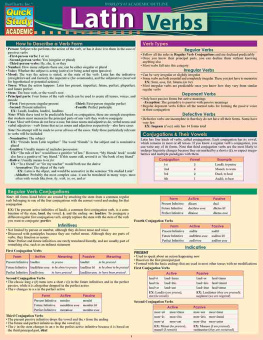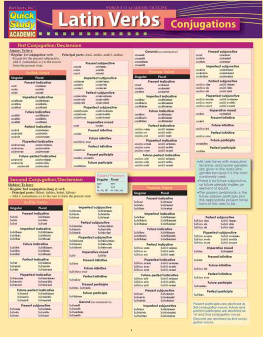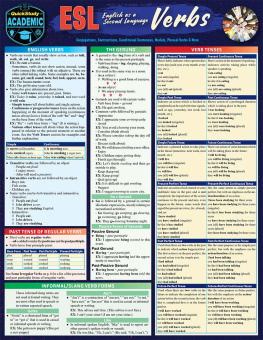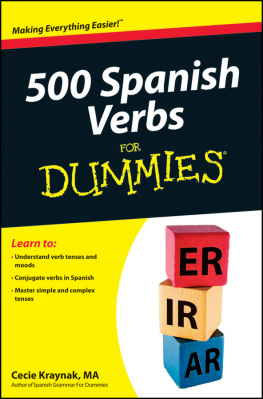To obtain PDFs for exercises from the printed version of this eBook, please .
This digital book includes all of the workbook exercises in a downloadable PDF format. To access this material, visit McGraw-Hill Professionals Media Center at http://mhprofessional.com/mediacenter/, then enter this e-books ISBN and your e-mail address. You will receive an e-mail message with a download link for the additional content. This eBooks ISBN is 978-0-07-181751-6.
Also by Richard E.
Prior:
Latin Verb Drills
Latin Demystified
Copyright 2013 by McGraw-Hill Education. All rights reserved. Except as permitted under the United States Copyright Act of 1976, no part of this publication may be reproduced or distributed in any form or by any means, or stored in a database or retrieval system, without the prior written permission of the publisher. ISBN: 978-0-07-181751-6
MHID: 0-07-181751-4 The material in this eBook also appears in the print version of this title: ISBN: 978-0-07-181783-7, MHID: 0-07-181783-2. All trademarks are trademarks of their respective owners. Rather than put a trademark symbol after every occurrence of a trademarked name, we use names in an editorial fashion only, and to the benefit of the trademark owner, with no intention of infringement of the trademark.
Where such designations appear in this book, they have been printed with initial caps. McGraw-Hill Education eBooks are available at special quantity discounts to use as premiums and sales promotions or for use in corporate training programs. To contact a representative please visit the Contact Us page at www.mhprofessional.com. Trademarks: McGraw-Hill Education, the McGraw-Hill Education logo, Practice Makes Perfect, and related trade dress are trademarks or registered trademarks of McGraw-Hill Education and/or its affiliates in the United States and other countries and may not be used without written permission. All other trademarks are the property of their respective owners. TERMS OF USE This is a copyrighted work and McGraw-Hill Education and its licensors reserve all rights in and to the work. TERMS OF USE This is a copyrighted work and McGraw-Hill Education and its licensors reserve all rights in and to the work.
Use of this work is subject to these terms. Except as permitted under the Copyright Act of 1976 and the right to store and retrieve one copy of the work, you may not decompile, disassemble, reverse engineer, reproduce, modify, create derivative works based upon, transmit, distribute, disseminate, sell, publish or sublicense the work or any part of it without McGraw-Hill Educations prior consent. You may use the work for your own noncommercial and personal use; any other use of the work is strictly prohibited. Your right to use the work may be terminated if you fail to comply with these terms. THE WORK IS PROVIDED AS IS. McGRAW-HILL EDUCATION AND ITS LICENSORS MAKE NO GUARANTEES OR WARRANTIES AS TO THE ACCURACY, ADEQUACY OR COMPLETENESS OF OR RESULTS TO BE OBTAINED FROM USING THE WORK, INCLUDING ANY INFORMATION THAT CAN BE ACCESSED THROUGH THE WORK VIA HYPERLINK OR OTHERWISE, AND EXPRESSLY DISCLAIM ANY WARRANTY, EXPRESS OR IMPLIED, INCLUDING BUT NOT LIMITED TO IMPLIED WARRANTIES OF MERCHANTABILITY OR FITNESS FOR A PARTICULAR PURPOSE.
McGraw-Hill Education and its licensors do not warrant or guarantee that the functions contained in the work will meet your requirements or that its operation will be uninterrupted or error free. Neither McGraw-Hill Education nor its licensors shall be liable to you or anyone else for any inaccuracy, error or omission, regardless of cause, in the work or for any damages resulting therefrom. McGraw-Hill Education has no responsibility for the content of any information accessed through the work. Under no circumstances shall McGraw-Hill Education and/or its licensors be liable for any indirect, incidental, special, punitive, consequential or similar damages that result from the use of or inability to use the work, even if any of them has been advised of the possibility of such damages. This limitation of liability shall apply to any claim or cause whatsoever whether such claim or cause arises in contract, tort or otherwise.
Contents
Acknowledgments
I would like to thank my dear friend and former student Brian Lupo for his assistance and contributions to this book.
Huge thanks are also due to my partner, Scott Henderson, for his bottomless store of patience. The publisher would like to thank Randall Childree for his assistance in preparing the second edition of this book.
Introduction
The core of a sentence in any language is the verb. All other words in a sentence modify the verb in their own way or modify words that are modifying the verb. In Latin, the verb system is far more complex than in most modern languages, which gives it an amazing beauty all its own, but also provides a challenge to us, thousands of years later, who would like to experience that beauty on its own terms. The greatest challenge in writing this book has been developing a format that would be the most useful to the most people studying this ancient language.
There are many textbooks, offering many approaches from many different angles, and so finding a format that would be the most flexible and useful has truly been a challenge. Another challenge has been to provide exercises beyond simple verb forms, so that verbs are used in context, but without placing unnecessary demands on the reader in nonverb areas of Latin study. To put verbs in context, however, requires nouns, whichgiven Latins highly inflected naturerequires some mastery of case uses for nouns. Since this book is designed for practice with verbs, not nouns, the case uses in the exercises have been kept simple so that mastery of only the most basic ones is assumed. Apart from certain verb forms, gender is invisible in Latin. In English, however, it is not.
For the sake of simplicity and uniformity, not to mention commonality in reading Latin texts, the assumed gender in this book, unless otherwise noted, is masculine. The reader may find discrepancies between the use of macrons in this book and that in some dictionaries. Conventions vary, but the reader should take heart in the fact that the Romans themselves didnt write macrons. In fact, they used no punctuation or any diacritics in writing, and likely did not even use spaces between words! Some vowels are long by nature and some are long by position (meaning those that are followed by two or more consonants). I have generally followed the convention of using a macron for vowels long by nature, but not for those long by position. There are more specialized areas of verb study that are not addressed in this book, such as the ending -re instead of -runt in the third-person plural, perfect indicative active, as is often seen in epic poetry.
The aim of this book is to offer mastery of fundamental Latin verb forms and applications; other details are left for advanced study. See
Unit 1
The Latin Verb System
This chapter gives a brief overview of the Latin verb system and explains the attributes by which verbs can be described and understood. It also provides an explanation of the many grammatical terms used in this book.
The Characteristics of Latin Verbs
In addition to meaning, a Latin verb contains five different characteristics: person, number, tense, mood, and voice. Some forms also denote gender.
First person is the speaker himself.
Next page







